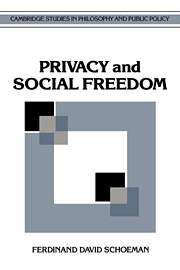Book contents
- Frontmatter
- Contents
- Acknowledgments
- Introduction
- 1 The meaning and scope of privacy
- 2 Mill's approach to social freedom
- 3 Articulated rationality and the Archimedean critique of culture
- 4 Social freedom from the perspective of cognitive and social psychology
- 5 The importance of cultural authority for morality
- 6 Explaining privacy's place
- 7 The ascent of privacy: a historical and conceptual account
- 8 Privacy and gossip
- 9 Privacy and spheres of life
- 10 Spheres of life: a literary exploration
- Epilogue
- Notes
- Index
4 - Social freedom from the perspective of cognitive and social psychology
Published online by Cambridge University Press: 23 October 2009
- Frontmatter
- Contents
- Acknowledgments
- Introduction
- 1 The meaning and scope of privacy
- 2 Mill's approach to social freedom
- 3 Articulated rationality and the Archimedean critique of culture
- 4 Social freedom from the perspective of cognitive and social psychology
- 5 The importance of cultural authority for morality
- 6 Explaining privacy's place
- 7 The ascent of privacy: a historical and conceptual account
- 8 Privacy and gossip
- 9 Privacy and spheres of life
- 10 Spheres of life: a literary exploration
- Epilogue
- Notes
- Index
Summary
Our understanding of privacy and the role it plays in structuring social freedom is the focus of this book. Obscuring our view of these concepts are confidence in a narrow notion of rationality and a corresponding denigration of culture and conforming tendencies in the properly formed moral consciousness. Evidence of this confidence and denigration appears in the preceding two chapters.
In those chapters, I illustrate the pervasiveness, if not the overall dominance, of a view of how moral judgment relates to cultural norms. According to that picture, cultural norms have no moral authority and only coincidental relevance. Independent validation of a norm is construed narrowly to require that one employ the principle of articulated rationality with reference to that norm. As I explained, this principle has two elements: (1) that one is not in a proper state vis-à-vis one's beliefs and values unless one is in possession of a rational defense of these principles and (2) that reference to what one's culture or community accepts is not part of a rational defense. The individual is judged competent to find compelling reasons of the right sort on which to construct a moral outlook. For the outlook to be successfully grounded, it should appeal to an individual with no preexisting allegiance to a community norm as such. For us to express our nature fully, we must renounce any appeal to how the cultures around us influence us.
- Type
- Chapter
- Information
- Privacy and Social Freedom , pp. 53 - 65Publisher: Cambridge University PressPrint publication year: 1992



